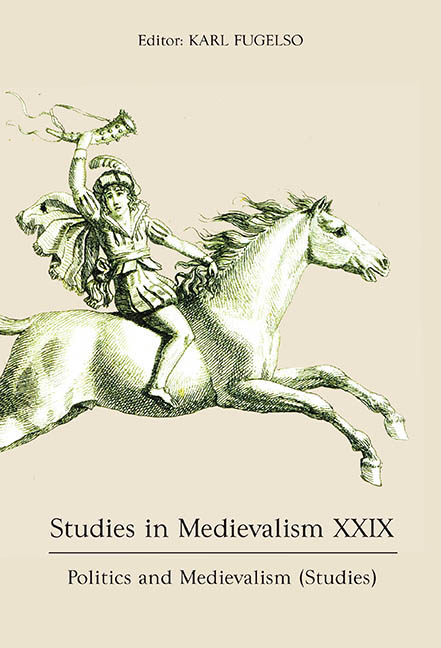Book contents
- Frontmatter
- Studies in Medievalism
- Acknowledgments
- Contents
- List of Illustrations
- Preface
- I Essays on Politics and Medievalism (Studies)
- Historical Malapropism and the Medieval Blood Libel in American Politics
- Putin’s Medieval Weapons in the War against Ukraine
- The Battle of Tours and the US Southern Border
- Medievalism, Brexit, and the Myth of Nations
- An Arthur for the Brexit Era: Joe Cornish’s The Kid Who Would be King
- II Other Responses to Medievalism
- Angle-ing for Arthur: Erasing the Welsh in Guy Ritchie’s King Arthur: Legend of the Sword
- Chasing Freyja: Rape, Immigration, and the Medieval in Alt-Right Discourse
- “Things painted on the coarse canvas”: Political Polemic in Jean-Paul Laurens’s Portrait of the Child Emperor Honorius
- Longfellow and Old English
- Archaeology and Medievalism at Julian of Norwich’s Anchorite Cell
- A Revelation of Love: Christianity, Julian of Norwich, and Medieval Pity in the Harry Potter Series
- In the Beginning Was the Word: How Medieval Text Became Fantasy Maps
- Objectivity, Impossibility, and Laughter in Doctor Who’s “Robot of Sherwood”
- Sonic Medievalism, World Building, and Cultural Identity in Fantasy Video Games
- Contributors
- Miscellaneous Endmatter
Longfellow and Old English
Published online by Cambridge University Press: 19 August 2020
- Frontmatter
- Studies in Medievalism
- Acknowledgments
- Contents
- List of Illustrations
- Preface
- I Essays on Politics and Medievalism (Studies)
- Historical Malapropism and the Medieval Blood Libel in American Politics
- Putin’s Medieval Weapons in the War against Ukraine
- The Battle of Tours and the US Southern Border
- Medievalism, Brexit, and the Myth of Nations
- An Arthur for the Brexit Era: Joe Cornish’s The Kid Who Would be King
- II Other Responses to Medievalism
- Angle-ing for Arthur: Erasing the Welsh in Guy Ritchie’s King Arthur: Legend of the Sword
- Chasing Freyja: Rape, Immigration, and the Medieval in Alt-Right Discourse
- “Things painted on the coarse canvas”: Political Polemic in Jean-Paul Laurens’s Portrait of the Child Emperor Honorius
- Longfellow and Old English
- Archaeology and Medievalism at Julian of Norwich’s Anchorite Cell
- A Revelation of Love: Christianity, Julian of Norwich, and Medieval Pity in the Harry Potter Series
- In the Beginning Was the Word: How Medieval Text Became Fantasy Maps
- Objectivity, Impossibility, and Laughter in Doctor Who’s “Robot of Sherwood”
- Sonic Medievalism, World Building, and Cultural Identity in Fantasy Video Games
- Contributors
- Miscellaneous Endmatter
Summary
On April 18, 1775, Paul Revere, an express rider carrying documents and news from Boston to places as far afield as New York and Philadelphia, was given the task of carrying a warning to John Hancock and Samuel Adams at Lexington and to the military supply depot at Concord, letting them know that regular British troops were about to move into that area. His trip was, as all American schoolchildren know, immortalized by Henry Wadsworth Longfellow. “Paul Revere's Ride” made the silversmith and messenger into one of the great heroes of the American Revolution, consigning the second man sent on the same mission, William Dawes, to the dustbin of history. Longfellow had the touch, the common touch. During his lifetime, from 1807 to 1882, Longfellow was by far the most famous and beloved of American poets, a fatherly and grandfatherly figure whose narrative poems on Hiawatha, on the Acadian tragedy of Evangeline, on Paul Revere, on the wreck of the Hesperus were studied in school and at home as a matter of course, and whose tender and telling lyrics on the village blacksmith, on long-suffering slaves, on various geographical landmarks of New England and Europe were memorized and recited. His volumes of collected and selected poetry were shelved prominently in most American (and many Canadian) homes through the latter half of the nineteenth century, and remarkably continue in print today despite the precipitous drop in Longfellow's literary popularity through the twentieth century. Every day, my grandmother used her Longfellow as she used her Bible, as a kind of sortes Virgiliae that she would open at random, read, and then interpret in terms of her current situation. Like the Bible, Longfellow was infinitely applicable. And nowadays, indeed for the whole of the twentieth century and the opening fifth of the twenty-first century, he is infinitely vilifiable, infinitely to be excoriated for his sentimentalism, his mawkishness, his tender sensibilities, and his romanticized glorification of duty and responsibility, his civic-mindedness, and his commonsense approach to the writing of poetry as a kind of matterof- fact job that had to get done each day.
- Type
- Chapter
- Information
- Studies in Medievalism XXIXPolitics and Medievalism (Studies), pp. 99 - 122Publisher: Boydell & BrewerPrint publication year: 2020



